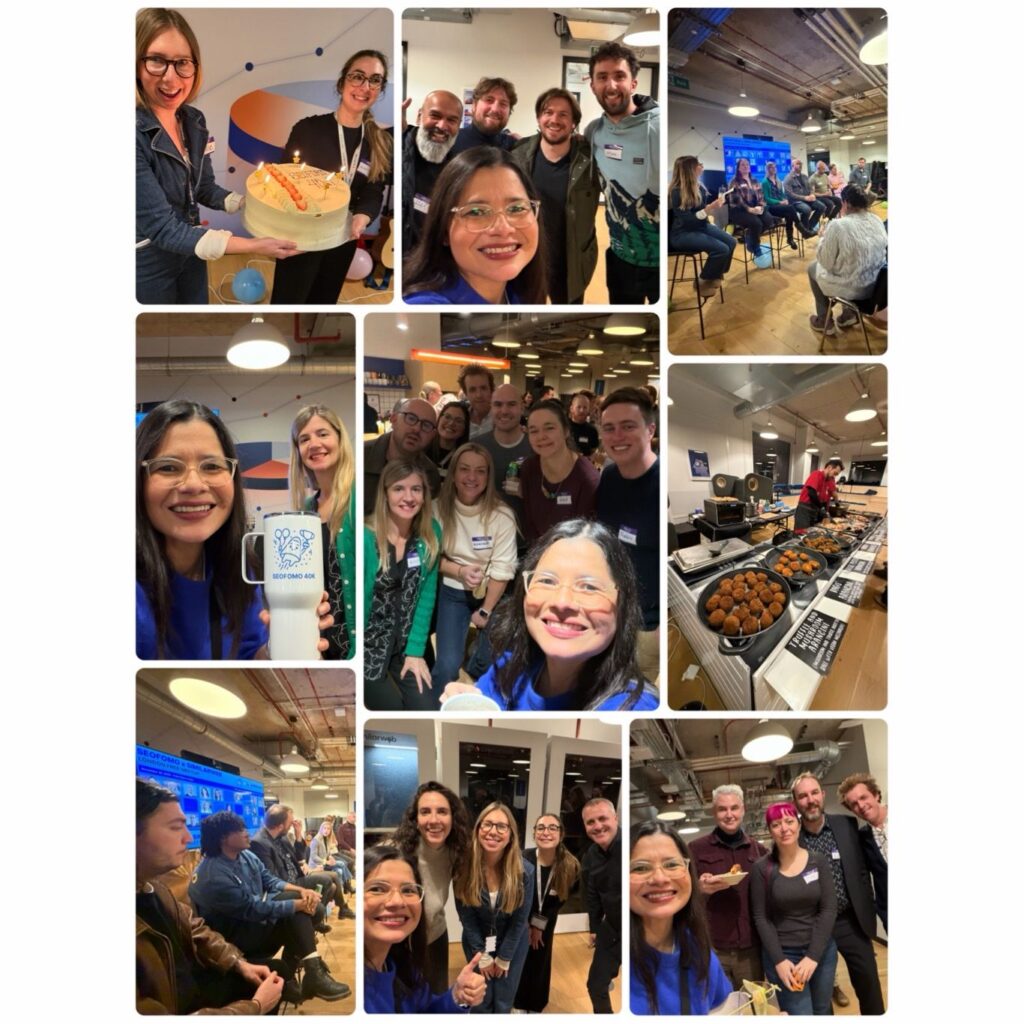
The room was buzzing with tipsy anticipation.
After 15 minutes of applying our name badges, some light networking and a free cocktail, 100 people sat expectantly, waiting to hear from an expert panel of SEO and AI consultants.
Anecdotes, studies and statistics were volleyed into the crowd who collectively nodded along with a beat as steady as a pulse oximeter.
When the time came for questions the biggest question on everyones lips was “How do we measure AI”. The question from the audience member was met with collective eye roll from the panel.
“You can’t measure LLMs – they are neural nets for goodness sake”
“Prompt tracking doesn’t work, you get a different answer for the same query”
“That’s a stupid question…they will release their own version of search console one day and that’s how we will measure it”
As the panel nervously tittered and struggled through opaque answers the audience was left with a feeling of mild dissatisfaction, like when you cut open a massive avocado to find it’s mostly a bulbous pit with no meat.
As the night went on, the conversations off stage were more colourful than those on-stage,
“I can’t say that to my boss, they want answers”
“Surely prompt tracking can’t be all that bad – I used a tool called Waikay and it seems to work well enough”
Thankfully, as we had access to some of Europe’s top SEOs, we continued the discussion and condensed our opinions down into some key points below.
SEOFOMO 40k Celebration
The above is a fictionalised exchange from the SEOFOMO 40k subscriber event, hosted by industry maven, the prolific Aleyda Solis. The event was a panel discussion about search and AI trends that was insightful, entertaining yet inconclusive on the issue of AI reporting. In the following post, we draw some of our own conclusions and provide our options on the topics covered at the event.
We highly recommend subscribing to the SEOFOMO newsletter as it’s the number 1 source of SEO news.
Subscribe to the SEO Newsletter here.

The panel discussion
The insights from the panel were fascinating, each coloured by their own unique interaction with clients and the algorithm. The most poignant exchanges included the following points:
- AI is the doorway to SEO – Anthony Barone, Managing Director of StudioHawk UK, a specialist SEO company
- Prompt tracking isn’t a thing – Barry Adams from Polemic Digital, Publishing SEO Specialist
- Basics first, before fancy AI optimisation – Iva Jovanovic, owner of Belgrade SEO Conference
- Brand is more important than ever – Judith Lewis, CEO of Decabbit, an integrated marketing and SEO consultancy
- Agentic search is the future but the very distant future. Chris Green – SEO and Digital Marketing Consultant with 15 years experience.
- Optimising for AI is just SEO and we should be doing all AI optimisation anyway, Emina Demiri-Watson from Vixen Digital, a Brighton Digital Marketing Firm
- Cost Benefit Analysis shoudl guide the big market decisions. Andy Chadwick – CEO of Snippet Digital, Reddit Marketing and SEO Agency and Founder of Keyword Insights
AI is the doorway to SEO
The Panelists View
Anthony Barone, CEO of Studiohawk UK, commented that the recent ‘shiny new toy syndrome’ ensnaring CEOs is actually putting SEO higher on the board room agendas with AI being the trojan horse to more discretionary campaign funds.
With this trend in mind, AI will create a new SEO golden era as its starts to hit critical mass with everyday consumers.
Type A View
We agree with this general sentiment but predict a different roll out across organisations.
AEO will start as R&D projects with budgets coming from product or technical stakeholders – not marketing stakeholders. This will make it inherently harder for SEOs to pitch AI services in the short term and risk the AI channel budgets being bundled into IT and technical budget lines.
Marketing has established KPIs, ROIs, ROAS and CPLs to achieve that are the life blood of the organisation, making marketing budgets off limits for speculative AI testing.
It also makes it off limits for long term retainers. Instead, organisations will build one off projects into their plans to test and learn how they are featured across AI surfaces. This will mostly come in the form of reporting, not tactical optimisation.
Smaller companies with higher risk tolerance profiles will employ “SEO like” tactics to grow their share of voice in AI, however, larger companies will build it into other brand building activity with the expectation it will trickle down and naturally boost AI visibility.
Prompt Tracking is Stupid
The panelists view
Perhaps the most contentious moment of the evening was the claim that prompt tracking was ‘stupid’ as the data is so wildly different from person to person and prompt to prompt, with panel citing if the same person enters the same prompt, the answer will be slightly different each time.
Type A View
This appraisal is too rudimental and misses the point.
In the same way that saying ‘keywords in a meta description is not a ranking factor’, is a technically true statement, it ignores the wider point that it affects CTR which in turn is a ranking factor.
So, whilst prompt tracking on it’s own will not give any real insights due to the lack of personalisation and context, it does provide a data point to help understand wider trends. Specifically,
- how often a brand is mentioned next to other entities
- relative mentions of a brand to their competition
It also neglects the idea of prompt chaining, the practice of chaining prompts together in sequential steps where the initial prompts pass variables that build a personalised marketing persona and then measure share of voice for subsequent prompts.
It also neglects the idea of ‘distance from discovery’, that is the percentage of times a brand is “discovered” through the same prompt over time and the patterns that result.
Sure, you get slightly different word formulations in your prompt answers but your don’t get a completely different answer.
For example, if you ask for the most reputable solicitor in London, over and over again, the formulation of the answer will use different words but the overall context and solicitors mentioned will be roughly the same. Even when applying constricting factors, like personalisation, the change in the overall prompt result isn’t so large that you can’t draw meaningful conclusions from it.
Brand is more important than ever
The panelist view
Judith Lewis made the astute observation that ‘brand’ is more important than ever when considering AI surfaces. This is a huge topic that needs a talk all on it’s own but if we had to flesh our ‘brand signals’ that affect AEO I would encapsulate it by using a technical SEO phrase of EEAT, experience, expertise, authenticity and trust but as its pertains to offsite content.
Type A view
Brand signals used in AI are likely to include:
- mentions, linked or unlinked
- reviews and write ups of all kinds, listicles in particular seem to be making a comeback
- citations – type your brand into Wikidata to get an idea of the citations used to help understand your brand as an ‘entity’
- co-citation of brand name and commercial keywords
- brand mention velocity and freshness
- social signals
It’s worth noting that the way in which they are implemented are likely to be slightly different to the standard SEO implementation with more emphasis being on accuracy, diversity and freshness of information.
AEO and SEO is the same thing
The panelist view
Emina from Vixen Digital made a point that the things we are now doing for AI, like producing more in-depth content and covering zero search volume queries is something we should be doing as SEOs anyway. Implying that the highly detailed work required for AEO is just SEO ‘done properly’.
Type A View
Academically, we agree. Commercially, we disagree. Andy Chadwick from Snippet Digital made a point earlier in the discussion that we will appropriate for our argument.
Andy said that ‘cost benefit analysis should determine all marketing decisions’, saying that their new reddit optimisation service is only right or certain business that would benefit from higher visibility in LLMs, citing a B2B business that sold underground broadband cables is less likely to need the service than a traditional e-commerce store.
Cost benefit analysis also applies to Emina’s assertion that we should be doing deep detailed SEO work as a matter of course. In most commercial situations a 70/20/10 distribution applies. That is, 70% of effort goes to critical and measurable work, 20% goes to long term work and 10% is “nice to haves”.
Summary
AI has captured more share of voice in the heads of CEOs and business leaders than the general public, making it a minot marketing channel…..for now.
The meteoric growth and AI mania makes it an inescapable topic. Much like buying beachfront property in the 70s it’s likely going to be an investment that pays off in the long run.
The real question is – how much budget are you willing to sacrifice on this long term bet whilst your still haven’t eaten the low hanging fruit in traditional search?
Thank You’s
Thank you to Aleyda for organising the event and congratulations on hitting 40,000 subscribers on the SEOFOMO newsletter.
Thank you also to SimilarWeb for sponsoring the event and providing the space and categorising.
And Thank you to StudioHawk UK for sponsoring the after party at N64, getting to play street fighter on a traditional arcade machine was the highlight of the evening.



